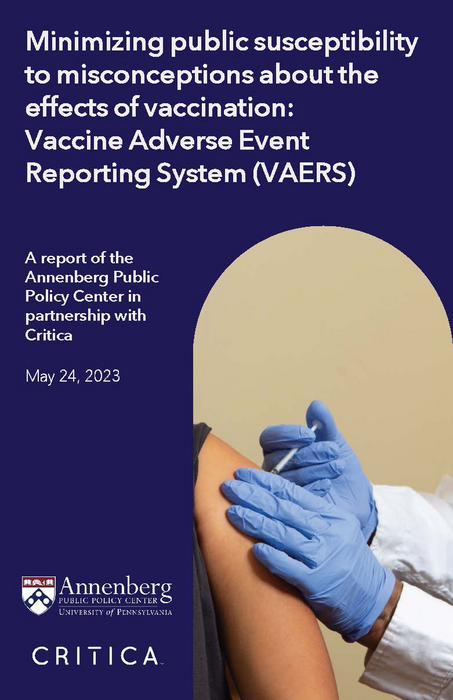PHILADELPHIA – The federal health system for reporting “adverse events” after vaccination, known as VAERS, is designed to assist in the early detection of complications and responsive action. But when the pandemic and advent of new vaccines for Covid-19 turned a spotlight on this formerly little-known system, the flood of web and social media references to it was accompanied by confusion about what the system is and what the reports in it signify.

Credit: Annenberg Public Policy Center
PHILADELPHIA – The federal health system for reporting “adverse events” after vaccination, known as VAERS, is designed to assist in the early detection of complications and responsive action. But when the pandemic and advent of new vaccines for Covid-19 turned a spotlight on this formerly little-known system, the flood of web and social media references to it was accompanied by confusion about what the system is and what the reports in it signify.
A new report from the Annenberg Public Policy Center examines misconceptions about the government’s Vaccine Adverse Event Reporting System, or VAERS. The report urges the government agencies that manage the system to change its name to a clearer alternative such as “Vaccination Safety Monitor” or “Vaccination Safety Watch,” and make additional changes to reduce the likelihood its information will be misinterpreted or misused.
“Minimizing public susceptibility to misconceptions about the effects of vaccination: Vaccine Adverse Event Reporting System (VAERS),” is the first in a series of case studies produced by the Annenberg Public Policy Center (APPC) of the University of Pennsylvania in partnership with Critica, a nonprofit organization that seeks to improve public understanding and acceptance of scientific evidence and counteract health- and science-related misinformation.
“As we’ve seen during the pandemic, public susceptibility to misconceptions about vaccination is increased by confusion about the nature of events reported to VAERS,” Jamieson said. “For example, nearly three-quarters of the public does not know that deaths reported to VAERS are not confirmed to have been caused by the Covid-19 vaccine. The recommendations in our report would help to clarify what this reporting system is and does.”
What is VAERS?
VAERS is a national program managed by the Centers for Disease Control and Prevention (CDC) and the Food and Drug Administration (FDA) to “monitor the safety of all vaccines licensed in the United States,” the CDC says. The program “collects and reviews reports of adverse events that occur after vaccination,” including deaths.
Anyone can submit a report to VAERS. The presence of a report in VAERS does not mean it is vaccine-caused. As noted in the Annenberg report, the CDC says VAERS reports “may contain information that is incomplete, inaccurate, coincidental, or unverifiable.”
To illustrate this point, one doctor famously reported to VAERS that after getting a flu shot, “his skin turned green, his muscles grew and he started having rage problems,” signs that he may have been turning into the Marvel Comics superhero the Incredible Hulk. That report was flagged for its unusual nature, investigated, and removed with the doctor’s consent.
Confusion about VAERS
There were few references to VAERS in digital media until November 2020, when the public learned that vaccines were on track to be authorized to fight Covid-19. After that point, web references to VAERS and public interactions with that content greatly increased.
Yet nearly two years later, there remained vast public confusion about what VAERS is and does. In a nationally representative August 2022 APPC survey, nearly two-third of U.S. adults (63%) were not sure whether deaths reported by VAERS were confirmed or not confirmed to have been caused by Covid-19 vaccination, and another 10% said, incorrectly, that VAERS deaths were confirmed to have been caused by Covid vaccination. Only a quarter of U.S. adults (27%) knew that VAERS deaths were not confirmed to have been caused by Covid vaccination.
An analysis of April 2022 APPC survey data found that the belief that deaths reported in VAERS are confirmed to have been caused by Covid-19 vaccines is positively associated with the belief that these vaccines are responsible for thousands of U.S. deaths. Among the people who believe that VAERS deaths are confirmed to be vaccine-caused, over half also believe that Covid-19 vaccines are responsible for thousands of deaths.
Recommendations
To clear up the public confusion surrounding VAERS, the Annenberg report recommends a series of steps:
- Change the name of VAERS to “Vaccine Safety Watch: Incident Reporting System.”
- Pending a name change, routinely point to VAERS’ clarifying subtitle, “A National Program for Monitoring Vaccine Safety.”
- Routinely describe the data as raw or unconfirmed.
- In all public statements, reiterate that VAERS data are unverified.
To read more about these findings, download the report here.
Some of the research included in the report was conducted as part of a grant from the Robert Wood Johnson Foundation. The views expressed in the report do not necessarily reflect the views of the Foundation.
The Annenberg Public Policy Center was established in 1993 to educate the public and policy makers about communication’s role in advancing public understanding of political, science, and health issues at the local, state, and federal levels.
Critica is a nonprofit organization whose mission is to develop and test new methods of advancing public acceptance of scientific evidence, counteracting scientific misinformation, and promoting the use of scientific evidence in public policymaking.




